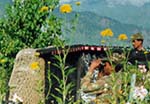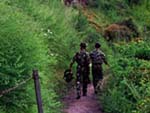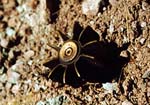
Go |
 |
The Rediff Special/Chindu Sreedharan
On The Cusp of Conflict
 Revellers ruled the streets elsewhere in the country. But at a forward post
in the Uri sector that must remain unnamed, Rediff On The NeT correspondent Chindu Sreedharan and photographer Jewella C Miranda found Independence Day very different. For August 15 is a dangerous day for the army in Kashmir.
Revellers ruled the streets elsewhere in the country. But at a forward post
in the Uri sector that must remain unnamed, Rediff On The NeT correspondent Chindu Sreedharan and photographer Jewella C Miranda found Independence Day very different. For August 15 is a dangerous day for the army in Kashmir.
Militants and the Pakistani army consider it an appropriate time to attack the Indian security forces. It is also the time Chindu and Jewella thought it right to go to the Line of Control, to live out India's Independence Day on the cusp of conflict.
It took weeks of persuasion and countless long distance phone calls to get the defence and home ministries to permit the assignment. This is their story:
August 15, 3.30 am
The greeting came from across the border early morning, neatly wrapped in thin metal sheets, each weighing roughly 700 grams. Twelve of them, there were, all evenly sequenced, travelling over 12 kilometres from behind the Pakistani village you could see spread out on the opposite hillock, to clear the proud Pir Panjal ranges in wide 45 degree arcs.
They exploded the quiet, chilly morning hours at the forward post
on the Line of Control into a day of controlled tension.
In his small, well-bunkered sleeping quarters, the post commander -- Tiger -- woke up with
the second explosion. Seconds later, the squat, ugly, battery-powered field telephone at his bedside shrilled violently, to be silenced immediately. He listened intently for a few seconds, replaced the receiver, was disturbed again, listened even more intently and was gone into the night -- unarmed, in his night clothes.
 A third shell burst on the mountain slopes. All over the camp, just as at the other three sub-units under its command, jawans were at action stations.
A third shell burst on the mountain slopes. All over the camp, just as at the other three sub-units under its command, jawans were at action stations.
"These are big guns, probably mortars or rockets, " Major Tourmaster (our guide for the tour) said, "The buggers, they are opening up!"
The mountain air was chilly outside -- especially so to us, two sleepy, ill-clad guests of war. The shells were still coming over. You could hear them bursting somewhere down, the muffled roars echoing on the hillsides, making it difficult to pinpoint where exactly it had struck. You couldn't see the flashes or the smoke either -- again, the uneven terrain made it difficult even for the trained eye.
Another shell burst in the distance and the sound rumbled on along the slopes. It was 3.40 am now.
At the base camp eight kilometres down, things were much hotter. The first few shots missed the camp completely, blasting the mountain slopes. The villagers there, rudely awakened from their slumber, followed the drill they had done countless times -- on the floor, behind barricaded walls, away from windows -- and prepared for another sleepless night.
The fifth or sixth or seventh shell -- the jawans aren't sure which --landed bang
in the open space in front of the camp. The next one was closer -- it exploded hardly 15 feet
from the barracks, fragmenting shrapnel all over, and sending quite a few in through the window panes. The huge rock near the window took most of it, and the scarred walls became even more so. The few pieces which went in, missed their intended targets -- for, the jawans were all out of barracks and in their bunkers even before the first echoes had died.
"We stayed in till 5.30 am," the officer in-charge was to say later, "after which I sent out troops to see the
extend of damage and to locate the tail units (of the shells)."
The damage was negligible. No one had 'bought' it, nor had anyone been injured -- and apart from a few broken window panes, scarred walls and some more minuscule craters, everything was 'normal.'
The bridge nearby, the obvious target of the Pakistani efforts, was untouched.
 But up at the post, nearly 6,000 feet above sea level, the tension was palpable. There was an uncertainty about the whole thing -- nothing, not the firing line nor the 'hit' was visible. Except for the roaring of the guns, there was no indication the post was under attack. And the roars continued -- 10 minutes into it, and I had already counted nine explosions.
But up at the post, nearly 6,000 feet above sea level, the tension was palpable. There was an uncertainty about the whole thing -- nothing, not the firing line nor the 'hit' was visible. Except for the roaring of the guns, there was no indication the post was under attack. And the roars continued -- 10 minutes into it, and I had already counted nine explosions.
"I hope those aren't rockets," the Tourmaster muttered as we stood shivering outside.
"Saab, aap log rest kariye. This will continue," the sentry, who had
been listening to our conversation, said, "You are safe here."
We waited a little more before turning in. The shelling had stopped -- the last one we heard was at 3.45 am -- and had been replaced by the odd rifle attempts.
A few minutes later, Tiger returned and was on the phone immediately.
"The base camp has been shelled, sir, but no injuries," he reported to his headquarters, "Can't say what gun now.
I don't think it is artillery, sir. I have spoken to everyone, but nobody saw the initial flash."
The receiver crackled for a minute. "No, no injuries," he said again, "We will know
about the gun when we locate the tail units in the morning..."
Morning -- 7 am -- saw him still on the phone. "Four tail units have been found," he told me, "We will know what gun it was from soon enough. And by the way, there was an injury after all -- a buffalo had shrapnel in its face. That reminds me--"
He picked up the receiver and spoke softly. "Doc, a buffalo has been injured down in the village.
The villagers will be bringing it over to you. Will you see to it?"
Two seconds later, the doctor's phone rang. Tiger was on the line again. "Er, doc, read cow for buffalo. It was a cow, not a buffalo... take care of it, will you?"
Earlier
Mines to your left, mines to your right. And as you walk along the narrow path, all what is there to stop you from tumbling down the explosive slopes is a scraggly
fence with boards proclaiming 'Danger' on it at random.
 After a torturous ride on an army jonga (a specially-built jeep) which transported
us half way on the last leg of the journey before its axle gave away, and an equally torturous, steeper four kilometre-trek, we were finally approaching our destination -- the forward post.
After a torturous ride on an army jonga (a specially-built jeep) which transported
us half way on the last leg of the journey before its axle gave away, and an equally torturous, steeper four kilometre-trek, we were finally approaching our destination -- the forward post.
Right from the time the army personnel picked us up in Srinagar, we had been travelling in convoys -- with one light machine gun-fitted army truck with rifle-weilding soldiers inside each behind and ahead of us.
These were the last 300 metres, this mine-sandwiched spur. We had passed the extolment 'Ek goli, ek dushman' (One bullet, one enemy) midway, and could see the bunkers, the small huts on top and the watchful eyes of the jawans.
"These are antipersonnel mines we have here. It takes just nine kilos to set these off," Tourmaster explained, "If you step on it, you won't die. But your leg below the knee will be gone, that's for sure."
"How dense is the concentration?"
It was the Lamb -- the second in command, a dashing second lieutenant -- who answered. "The mines here are unmapped, you know. To date, we have
not removed even a single one," he says, "Which means you have got mines from 1947 here!"
We had reached the top by now. Opposite, just across, was Pakistan. ("Islamabad is less than
200 kilometres away from here.") You could see their bunkers if you knew where to look. And if you looked down the mine-filled slopes, you could see a small nalla some two kilometres down which, like its mother Jhelum, meandered its way across the valley.
That was where India ended and Pakistan began.
Photographs: Jewella C Miranda
"We retaliate only when we have to. And then, we don't do it the chota mota way. We hit them hard with everything we got!"
Tell us what you think of this report
|



